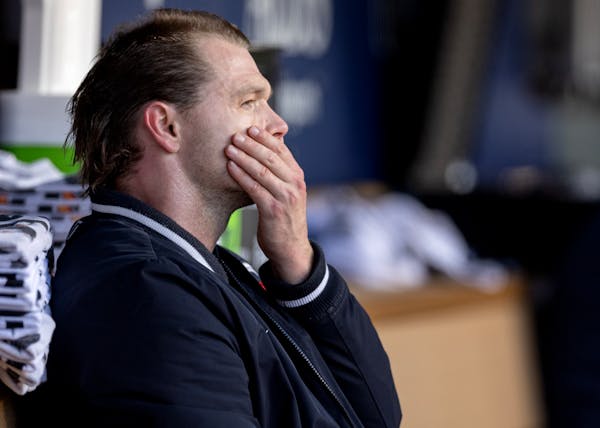 See
more of the story
See
more of the story
The final out of Wednesday's 3-2 Twins loss felt particularly abrupt. Barely 24 hours earlier, Twins players and fans had entertained notions of winning two games at Target Field against the Astros and advancing to the American League Championship Series, where they would have had the home field advantage against Texas.
Instead, two losses sent them swiftly into the offseason. After 168 meaningful games this year, suddenly there was no game coming up. Instead, questions about the roster for 2024 rushed to the forefront.
Can the Twins sign Sonny Gray and/or Kenta Maeda, rotation mainstays who keyed the team's success this season? If not, can they find suitable equivalents? Will they pick up options on Max Kepler and Jorge Polanco, long-time Twins regulars?
And after the payroll swelled above $155 million this season, what will it look like next year as the Twins' tenuous but important ($54.8 million per year) contract with Bally Sports North expires at the end of the World Series and a less-lucrative but more fan-friendly deal potentially replaces it?
Bobby Nightengale and I talked through a lot of those questions on Friday's Daily Delivery podcast.
But I also talked about this: Would our conversation about the offseason have been forestalled had the Twins benefitted (or at least not been actively harmed) by so many ball-strike calls throughout the postseason? Would Bobby and I have been talking about a Game 5 in Houston on Friday night, for instance, instead of the future?
It's certainly possible if we look at two separate but related calculations.
The first: The site Umpire Scorecards uses ball-strike data from every MLB game to see which teams benefited and which were harmed by pitches incorrectly called one way or the other. Expected runs can shift dramatically on the basis of missed calls, especially if they tilt toward a pitcher or hitter in a key run-scoring situation.
In all but one of the Twins' six playoff games, their opponent benefited from missed calls and the Twins suffered. Ironically, the only one where the Twins had the edge was their 9-1 blowout loss to Houston in Game 3, when missed ball-strike calls were expected to help the Twins by 0.31 runs.
In their other five postseason games the Twins were on the short end of missed calls each game, helping opponents outpace the Twins by a whopping 4.1 expected runs combined.
That said, the biggest impacts actually game in the two games the Twins won against Toronto, when they overcame a 1.46 expected run gap in Game 1 from missed calls and 0.96 runs in Game 2 to win both tight games.
In Games 1 and 4, winnable games against Houston that turned into 6-4 and 3-2 losses, respectively, the Twins were at about a half-run disadvantage in each.
The most impactful missed call in Wednesday's elimination game? A strike three against Max Kepler with two outs in the sixth inning on a 2-2 pitch that should have been called a ball. Royce Lewis was attempting to steal second on the pitch and would have been safe. Kepler should have had a full count with a runner in scoring position and the Twins trailing by a run.
By the time the Twins had played their final playoff game Wednesday, the X site Pitch Profiler noted that 38 ball-strike calls had been incorrectly called to their detriment, 11 more than any other team.
There are some caveats, though. The Twins had played six games at the time of that post, at least one more than any other playoff team.
And their style, at least at the plate, leaves them prone to the whims of an umpire's strike zone. They struck out more than any other team in major league history this season, and in the playoffs they swung at just 45% of pitches — second-lowest among the 12 teams as of now.
As noted, the most egregious disadvantages came in games the Twins won anyway against Toronto. But it is fair to wonder how a few calls that were correct — or even some key ones that were incorrect in their favor — might have tilted Game 4 in particular.
Overall, I wouldn't say a ball-strike call disadvantage is why the Twins are sitting at home instead of getting ready for Pablo Lopez vs. Justin Verlander tonight. But it sure didn't help, particularly at the plate where the Twins needed all the help they could get.
Here are four more things to know today:
*Pro Football Focus gives the Vikings the No. 2 pass blocking grade and No. 1 run blocking grade in the entire NFL through five games. ESPN's win rate metric is similarly complimentary, saying the Vikings are sixth and fifth in pass and run blocking, respectively. That runs counter to the narrative of the offensive line's struggles and — if we believe those metrics — makes you wonder who or what is to blame for the Vikings' middling offense aside from turnovers.
*MLB filed two motions in the Diamond Sports bankruptcy case this week, including one that argues Diamond Sports shouldn't be given another extension as it tries to sort out its path forward.
*We talked on Friday's Access Vikings podcast about what Danielle Hunter's trade value might be if the Vikings decide to move him. Bill Barnwell at ESPN proposes a deal to the Lions in which the Vikings would sent Hunter and a fifth-round pick to Detroit for a second-round pick, young edge rusher James Houston and a conditional third-round pick contingent on Hunter re-signing with the Lions. I'd say sign me up for that. Barnwell also suggests linebacker Jordan Hicks could fetch a fifth-round pick in a trade.
*The Gus Bus cannot be stopped, on or off the ice.







